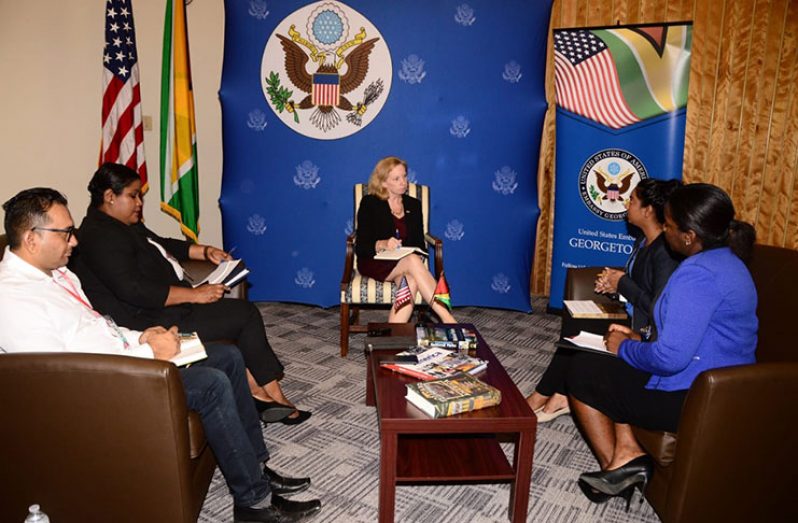WITH the number of Venezuelan migrants in Guyana increasing as a direct result of the growing socioeconomic and political crisis in Caracas, United States Ambassador to Guyana, Sarah-Ann Lynch said Monday that her country is open to having discussion on financial aid for the migrants.
Ambassador Lynch was responding to a question during a joint interview on whether the United States Agency for International Development (USAID) would be offering financial support to Guyana to assist Venezuelan migrants as was recently done in Trinidad and Tobago. USAID has made available US$1.6M to the people of Trinidad and Tobago to assist Venezuelans fleeing their homeland.
During the interview on Monday at the U.S Embassy, Ambassador Lynch said the U.S has been providing assistance through the United Nations Children’s Fund (UNICEF) and the International Organisation for Migration (IOM). The American Ambassador said the Guyanese Government has not approached the U.S for financial assistance, but it is an area the Embassy is willing to explore, given the increasing number of Venezuelans here. She said that in her interactions with officials here, the Government has expressed concern.
“What I have offered is that I am happy to have the embassy explore this issue, and have additional conversations if they would like assistance,” Ambassador Lynch said, adding that assistance in the area of health may very well be a good starting point, given the current strain on the country’s health sector. It was noted that the majority Venezuelans coming here have not had decent healthcare in recent years.
The U.S Ambassador said that like the Government, the U.S is taking stock of the increasing number of Venezuelans here. “The Government estimates the numbers right now to be about 5800; that is almost 6000 and that number is almost double what it was six months ago. So I think there is concern that this may continue, and the numbers may continue to increase,” she noted.
Ambassador Lynch observed that while in the past, Venezuelans settled in villages close to the border, they are now moving further inland along the coast and other parts of the country. “A few weeks ago, there was a vessel with about 140 Venezuelans that came right into Georgetown, she said. “So that is an indicator that maybe things are worsening a little bit.”
During a visit to Corriverton, the American Ambassador met a Venezuelan who was working in a restaurant. For her, it was “an interesting” observation.
The US$1.6M provided to the Trinidadian Government will focus on strengthening community resilience and capacity to address the recent influx of Venezuelan refugees and migrants to the Twin Island Republic. Funds will not be distributed directly to persons in need, but will be used to assist the people of Trinidad as they assist the people of Venezuela who have migrated in an attempt to escape the hardship facing their homeland.
More than three million Venezuelans have fled their country since 2015, according to the United Nations. Over the past two years, the United States has given, or allocated, more than US$150M in assistance to help countries in the region manage the impacts of the political and humanitarian crisis in Venezuela, the U.S Embassy in Trinidad and Tobago states.
Meanwhile, Ambassador Lynch said the U.S is worried about the political and economic turmoil in Venezuela. “It has been a declining situation for years,” she noted.
The Ambassador made it clear that her country will not recognise Nicolas Maduro as the President of Venezuela. She said the “so-called” 2018 Presidential Election, in which Maduro was declared winner, was fraudulent. Maduro was declared the winner after major opposition parties were banned from participating. “The U.S as well as other countries does not recognise the Maduro regime as legitimate. We recognise Juan Guaido as the interim leader,” the U.S Ambassador stated. She said Maduro should step aside and allow his country to be rebuilt.



.jpg)









